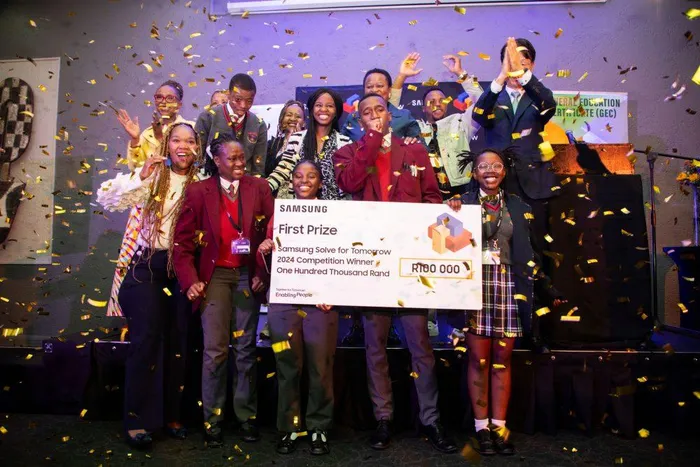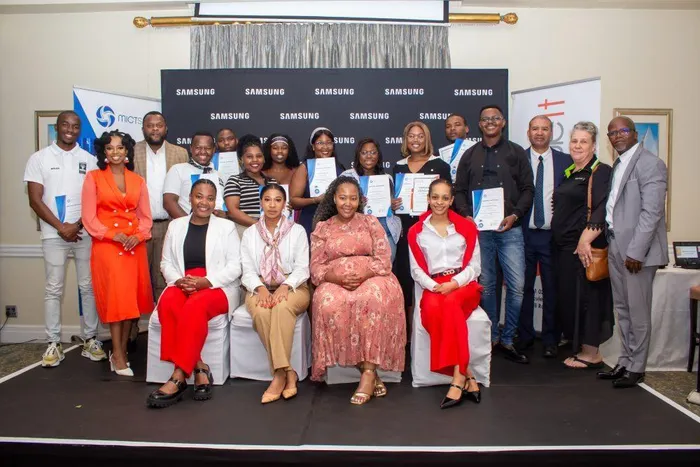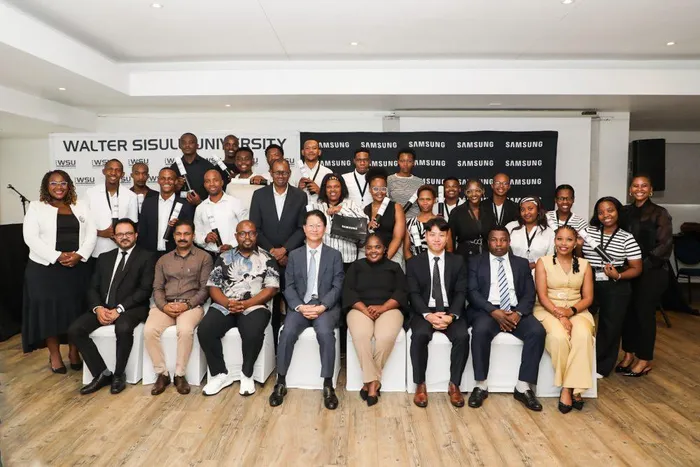
Samsung initiatives include partnerships with black SMMEs, workplace training, and education-based CSR
Image: Supplied
Samsung has accomplished a remarkable milestone by maintaining its Level 1 B-BBEE (Broad-Based Black Economic Empowerment) status for seven (7) consecutive years, an affirmation of its genuine commitment to transformation as well as continued development and growth in South Africa.
The company has continuously set new benchmarks in the industry and confirmed its determination in driving economic transformation in South Africa through its B-BBEE Initiatives. The retention of this Level 1 B-BBEE rating signifies and emphasises Samsung’s ongoing commitment to driving meaningful and sustainable economic transformation, diversity and inclusion within the organisation and the wider South African business landscape.
Over the years, Samsung has demonstrated its dedication to diversity and inclusion through a number of B-BBEE initiatives illustrated by its diverse workforce, partnerships with black SMMEs, access to supply chains, investment in workplace training, graduate programmes as well as its education-based Corporate Social Responsibility (CSR) initiatives.
These B-BBEE initiatives are driven through Samsung’s landmark R280-million Equity Equivalent Investment Programme (EEIP), which was launched in May 2019 in collaboration with the Department of Trade, Industry and Competition (Dtic). Samsung is now celebrating six years of this programme’s sustained success. This EEIP programme is projected to have a measurable impact on job creation in the South African economy. Now in its seventh year, the EEIP programme has managed to rise to the challenge of achieving its ambitious goals.
Samsung’s unwavering dedication to creating a more inclusive and equitable business environment is proven once more by the maintenance of this Level 1 B-BBEE status. Also, this rating re-affirms Samsung’s continued drive to genuine economic transformation in South Africa and investment in the various pillars of the scorecard. The company’s approach to B-BBEE over the years - has focused on five key pillars: Ownership through EEIP & Management Control, Employment Equity & Skills Development, Preferential Procurement & Enterprise Development as well as Socio-Economic Development (Social Responsibility).

Samsung maintains its Level 1 B-BBEE status for 7 years, underscoring its commitment to economic transformation in South Africa.
Image: Supplied
As a good corporate citizen that has consistently supported the country’s transformation agenda in the last three decades, Samsung has invested in a number of specific initiatives that have contributed immensely in fostering a more equitable society. As part of its skills development initiatives, Samsung has various programmes focused on electronics technician training, including the MICTSETA accredited Young Technician Programme.
The aim of this MICTSETA accredited Young Technician programme is to bridge the gap between education and employment. This is a structured learnership programme that combines practical work experience with theoretical training. The programme provides learners with skills to be able to work at Samsung Accredited Service Centres. This 12-month programme equips learners with technical skills as well as behavioural competencies giving them hands on experience - enabling the learners to successfully enter the work place environment.
Samsung believes in supporting academically deserving students with proven financial need to take their first steps toward achieving their dreams and to obtain their first Undergraduate or Honours Degree. The Samsung External Bursary programme aims to fund academically deserving students who do not have the financial means to study full time towards an Undergraduate or Honours degree at a South African University or University of Technology. The programme also prioritises people living with disabilities. The aim of the programme is to address skills shortages as well as to attract talent pool aligned to Samsung’s business model. In 2024, Samsung benefited 122 bursars, including 82 students with disabilities.
This well-considered and integrated approach has enabled Samsung to partner with universities and SETA accredited training providers to train 1440 software developers and accredited technicians to enhance their prospects of securing employment, starting their own businesses and further training. The training of unemployed youth addresses a key need in the South African ICT sector and has resulted in a marked increase in female software developer and artisan graduates.
Also, in an effort to prove that its transformation agenda is not just a tick box exercise - Samsung has increased its focus on unemployed learners through its internship and learnership programmes - supported by an emphasis on creating work experiences during and post the learnership or internship period. This skills development programme is geared towards ensuring that Samsung increases the employability of the country’s young hopefuls. Samsung’s programme reach extends beyond Gauteng, it also includes Limpopo, Eastern Cape, Kwa-Zulu Natal and the Western Cape provinces.

The EEIP is crucial for job creation, showcasing Samsung's investment in South Africa’s future.
Image: Supplied
In addition, Samsung’s efforts when it comes to enterprise development include its re-direction of existing spend to qualifying Black-Owned and Black-Women Owned Qualifying Small Enterprises (“QSEs”) and Exempt Micro Enterprises (“EMEs”). The company has ensured that these small enterprises were included in the existing procurement value chain of Samsung with a focus on the following, approved areas: Marketing, Services, Sales, Logistics and Recruitment. And, as part of the third phase of the Enterprise Development & E-Waste programmes which was launched towards the end of 2021, a further investment of over R60-million is planned over the next three years.
And furthermore, as part of its contribution to socio-economic development: Samsung has invested in education-focused initiatives that include the Samsung Innovation Campus (SIC) which teaches 4IR skills including coding and programming, AI, IoT and big data to students in higher learning institutions.
And furthermore, Samsung has over the years ploughed further resources into the global Solve For Tomorrow (SFT) competition that is now in its third year of execution - targeting grade 10 and 11 learners from disadvantage schools across the country to solve community problems through Science, Technology, Engineering and Maths (STEM). These education-focused initiatives that are driven through technology are a re-affirmation of the company’s commitment to STEM education and the upliftment of underserved communities.
Samsung believes that all these efforts are essential in driving economic transformation in the country and creating a more inclusive and equitable business environment. The seven years of retaining this outstanding Level 1 B-BBEE status is a true reflection of Samsung’s profound, long-term and impactful dedication to transformation which transcends mere compliance.
